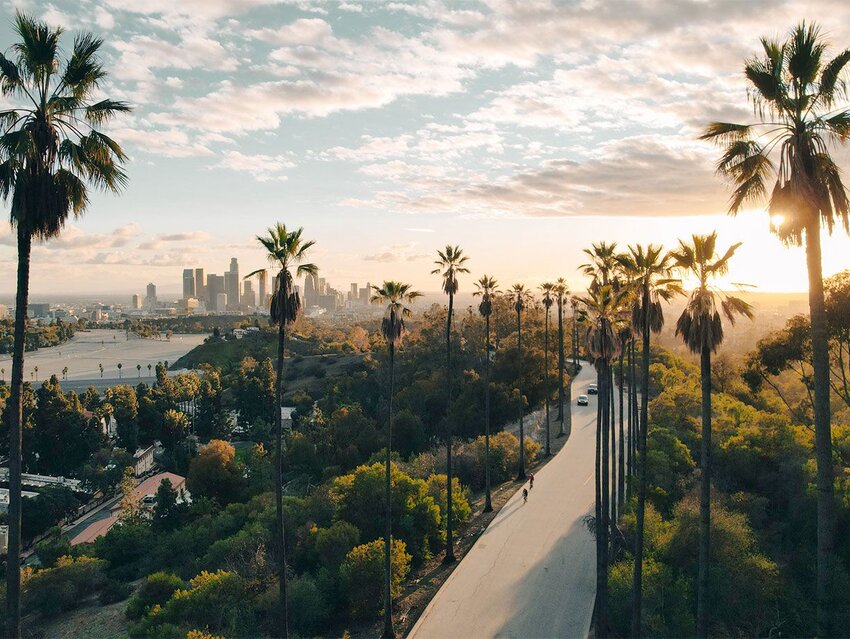Is the West Coast really the best coast? Maybe that’s just a rhyme, but what we can vouch for is the gnarly West Coast jargon that has emanated from the region. From SoCal to Seattle, more than 45 million people live in the Pacific Coast states of California, Oregon, and Washington. With so many residents, the diverse culture has resulted in some skookum regional colloquialisms that are hella interesting to learn about and use.
Dude
“Dude” might have originated on the East Coast, but it didn’t take long for the West Coast to lay claim to it. Today, “dude” is most commonly used as an informal way to refer to a friend (“Hey, dude!”) or as a synonym for “guy” (“I saw this dude walking down the street”). Back in the 1880s, when the word emerged, it was New York City slang for a “fastidious man” — that is, someone who paid great attention to their clothes and manners.
By the 1920s, the word was adopted in the Wild West to refer to East Coasters who were vacationing in the American frontier. This is where the term “dude ranch” (a ranch for tourists) originated. The word hung around the West and today is more commonly associated with the West Coast, especially in central and southern California. According to a nationwide poll, “dude” is by far the preferred word to use to refer to a friend on the West Coast, beating out “bro,” “buddy,” “fella,” and “pal.”
Gnarly
To most of the country, “gnarly” is used to describe something that is bad, difficult, or challenging. It came from the 17th-century word “gnarled,” meaning “full of knots,” which is most often used to describe tree branches. West Coasters have flipped the definition of “gnarly” to mean the opposite: Californians use it as slang for something that is “cool” or “excellent.” This version of the word emerged in 1970s surf culture (“gnarly waves”) and spread as a popular slang word for teens by the ’80s.
Hella
To some, this might seem like a cheesy line used in Hollywood films, but for residents of northern California, especially in the Bay Area, “hella” is a common colloquial synonym for “very” or “a lot,” as in, “We were hella late because the BART stopped running.” It emerged in the 1980s and ’90s, probably as a modification of the phrase “hell of a,” used as an intensifier.
Jojos
In the Pacific Northwest, some (but not all) potato wedges are “jojos.” Most popular in Seattle, this dish started as fast food and quickly made its way into diners, bars, and restaurants. Jojos are potato wedges that are battered (similar to fried chicken), seasoned, and fried until their interior is soft like a baked potato. In the Bay Area, they’re also called “mojos.” These crispy treats were apparently invented when some fried potatoes were mistakenly served by a fryer company during a food expo, but their name is still a mystery; it might have been completely random.
June Gloom
Like every other region of the U.S., the West Coast has its own weather terminology. California is often celebrated for its blue skies and temperate climate, but late spring and early summer are a rough spot for the West Coast. These months are referred to as “May Gray,” “June Gloom,” “Juneuary,” and “No-Sky July,” which describe the dreary, cloudy weather during this time.
Muckety-muck
A muckety-muck, muck-a-muck, or even a mucky-muck is an arrogant person — as in, “That actor is such a muckety-muck.” It’s used in PNW states, especially Washington and Oregon, where it was derived from the native Chinook language. In Chinook, the word makamak meant “plenty to eat,” and someone who had access to lots of food often had a high status, so they were called a hayo makamak. The phrase “high muck-a-muck” was adopted into English in the mid-19th century and was shortened to “muckety-muck” by the end of the 19th century.
Skookum
This PNW term is one of a few words from the native Chinook language that is mainstream in the region today. Its modern definition is “strong” or “excellent,” as in, “That’s a skookum suit.” Chinook Wawa is now a dead language, but some experts consider it the first language of Vancouver, British Columbia.
Stoked
Being “stoked” for something is a good thing; it means you’re excited. This Californian surfer slang emerged in the 1960s to describe being in an enthusiastic or exhilarated state. It came from a much older 17th-century verb, “stoke,” meaning “to feed a fire (or poke it) to stir up flames.” By the 1830s, “stoke” meant “to rouse up feelings,” which eventually transformed the term into the popular West Coast word used today.
The Mountain Is Out
In the PNW, if the local “mountain is out,” it’s a clear, sunny day. If “the mountain is out” in the Seattle area, Mount Rainier, the tallest peak in the Cascades, is visible, and it’s a nice day outside. This phrase is also used for Mount Hood in Portland, Oregon, and for a handful of other big regional mountains.
Featured image credit: Ryan Herron/ iStock

